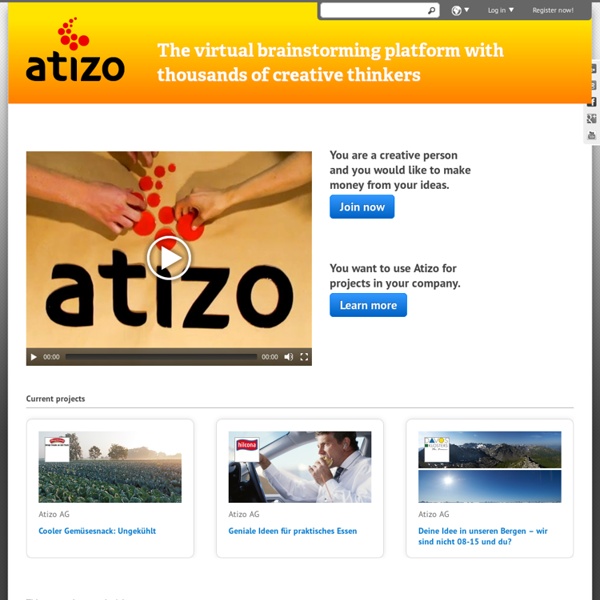



User Innovation and Firm Boundaries: Organizing for Innovation b These pages are about the symposium presentation held during the Academy of Management 2008 meeting in Anaheim. Participants The session was organized by Marcel Bogers (Ecole Polytechnique Fédérale de Lausanne). Presenting their individual papers were Allan Afuah (University of Michigan), Lars Bo Jeppesen (Copenhagen Business School), Wim Vanhaverbeke (Hasselt University & Eindhoven University of Technology) and Joel West (San José State University). These papers were discussed by Frank Piller (RWTH Aachen University) and Christopher Tucci (Ecole Polytechnique Fédérale de Lausanne). Schedule Slides are being posted as they are made available by the speakers. Abstract Despite increasing evidence and recognition of users as innovators, our understanding of the role of users in the innovation process is incomplete.
Aspen Ideas Festival | Engaging Ideas that Matter Crowdsourcing Innovation: Q&A with Dwayne Spradlin of InnoCentiv In recent years, corporations have turned to open innovation to solve their toughest research problems and reduce runaway costs of R&D. Now non-profits are beginning to see prize-based innovation as a strategy for humanitarian causes too, such as developing medicines to fight tuberculosis in the developing world, cleaning up oil spills or designing solar technologies for villages in rural India and Africa. InnoCentive is the premier open innovation marketplace in the world, where corporations and non-profits post their toughest research problems and a global network of 160,000 solvers takes a crack at solving them for cash rewards. Non-profit challenges have grown to about 20 percent of the InnoCentive portfolio, up from virtually none only two years ago. --Is InnoCentive doing more in the non-profit space? We’re doing more in the non-profit space than ever. --People often talk about crowdsourcing as a way to tap technical expertise around the world. That’s absolutely the case.
Idea Camp - European Cultural Foundation The Idea Camp is an opportunity to highlight some of the most creative and adventurous ideas from across Europe and neighbouring countries and bring them to the attention of key policy makers and opinion formers. And it supports ECF’s ambition to build a strong community of practice. The Idea Camp is co-developed with the six hub partners of the Connected Action for the Commons programme and each year is hosted by one of them. Each year the thematic focus connects to our Connected Action for the Commons programme. The theme for the 2015 Idea Camp is Build the City. Build the City is about people creating sustainable cities through social cooperation and active participation with culture at its heart. More than urban environments, ‘The City’ can also refer to a neighbourhood or community where people are working together through cultural activities to shape their environments, improve their common life and develop new social and economic relationships.
Innovations: Technology, Governance, Global Philip E. Auerswald and Iqbal Z. Quadir, Editors Innovations is about entrepreneurial solutions to global challenges. The journal features cases authored by exceptional innovators; commentary and research from leading academics; and essays from globally recognized executives and political leaders. The journal is jointly hosted at George Mason University's School of Public Policy, Harvard's Kennedy School of Government, and MIT's Legatum Center for Development and Entrepreneurship. Authors published in Innovations to date include three former and one current head of state (including U.S.
Wired 14.06: The Rise of Crowdsourcing Remember outsourcing? Sending jobs to India and China is so 2003. The new pool of cheap labor: everyday people using their spare cycles to create content, solve problems, even do corporate R & D. By Jeff HowePage 1 of 4 next » 1. Story Tools Story Images Click thumbnails for full-size image: Claudia Menashe needed pictures of sick people. In October 2004, she ran across a stock photo collection by Mark Harmel, a freelance photographer living in Manhattan Beach, California. The National Health Museum has grand plans to occupy a spot on the National Mall in Washington by 2012, but for now it’s a fledgling institution with little money. After several weeks of back-and-forth, Menashe emailed Harmel to say that, regretfully, the deal was off. iStockphoto, which grew out of a free image-sharing exchange used by a group of graphic designers, had undercut Harmel by more than 99 percent. He can’t, of course. It took a while for Harmel to recognize what was happening.
Crowdsourcing Crowdsourcing bezeichnet die Auslagerung traditionell interner Teilaufgaben an eine Gruppe freiwilliger User, z. B. über das Internet. Diese Bezeichnung ist an den Begriff Outsourcing angelehnt, die Auslagerung von Unternehmensaufgaben und -strukturen an Drittunternehmen.[1] Begriff[Bearbeiten] Crowdsourcing ist ein von dem amerikanischen Journalisten Jeff Howe (Wired Magazine) geprägter Begriff,[2] der erstmals 2006 in dem von Howe verfassten Artikel "The Rise of Crowdsourcing" vorgestellt wurde.[3] Definition nach Nicole Martin, Stefan Lessmann und Stefan Voß: "Crowdsourcing ist eine interaktive Form der Leistungserbringung, die kollaborativ oder wettbewerbsorientiert organisiert ist und eine große Anzahl extrinsisch oder intrinsisch motivierter Akteure unterschiedlichen Wissensstands unter Verwendung moderner IuK-Systeme auf Basis des Web 2.0 einbezieht. Eine erste sozialwissenschaftliche Annäherung an das junge Phänomen erarbeitet Christian Papsdorf mit folgender Definition: – Ch.
Interaktive Wertschöpfung & Crowdsourcing -- Open Innovation, Pr Mass Customization, Customer Integration, Open Innovation & Pers